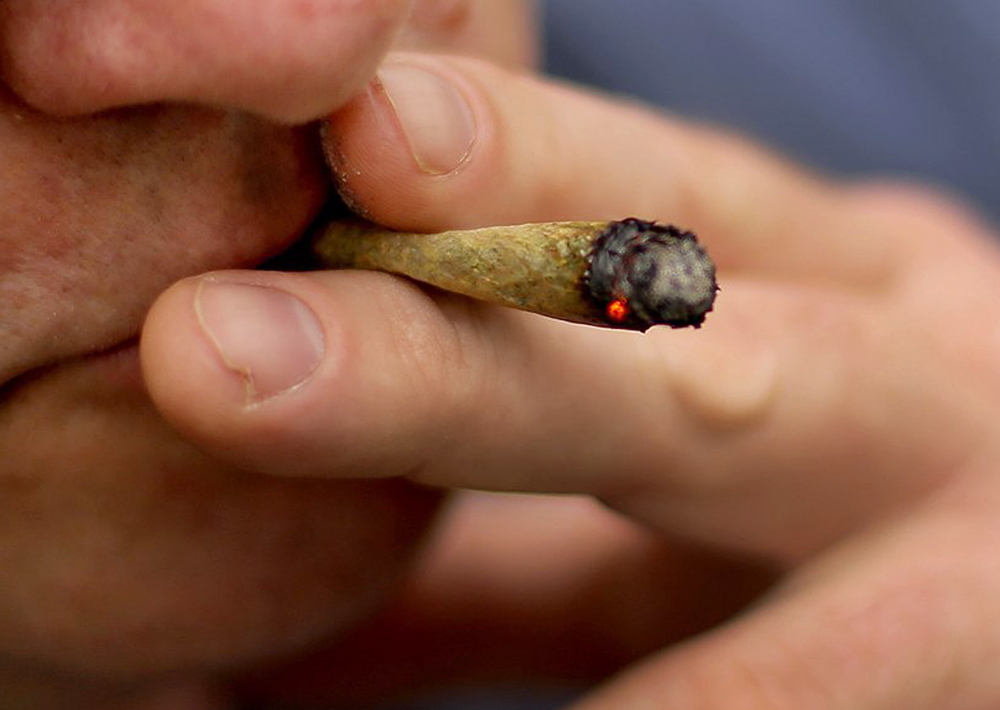AUGUSTA — Two groups with “grave” concerns about the legalization of recreational marijuana on Monday kicked off a yearlong effort to educate Mainers about the potential impact of the drug on youth and public health.
Supporters of Smart Approaches to Marijuana Maine and the Maine Alliance to Prevent Substance Abuse said during a news conference at the State House that the conversation around marijuana in Maine needs to include what science has learned about marijuana and its harmful effects.
The groups are coming together at a time when marijuana is expected to take center stage as two separate groups advance efforts to legalize recreational marijuana, and state legislators are expected to grapple with a number of bills related to pot.
“We know the marijuana conversation in Maine is going to continue,” said Scott Gagnon, the director of SAM Maine, who last year led the opposition to campaigns to legalize recreational marijuana in South Portland and Lewiston. “We do not need to settle for the continuing message of inevitability.”
Lewiston rejected the legalization attempt, but South Portland joined Portland in allowing the possession of small amounts of the drug by adults. Marijuana remains illegal under state and federal law.
Rep. Diane Russell, D-Portland, says she will introduce her fourth bill to tax and regulate the use of recreational marijuana. She said this bill will be the Legislature’s last chance to get out in front of two competing citizen initiatives that are likely to appear on the 2016 ballot. Two groups – the Marijuana Policy Project and Legalize Maine – plan to launch petition drives to collect signatures for 2016 referendums to legalize recreational drug use, as the states of Colorado and Washington have done. The two proposals differ in approach and details, such as whether marijuana use should be limited to private homes or allowed in social clubs.
The Department of Public Safety is proposing a bill that would set a limit to allow police officers to determine when a driver is too stoned to be behind the wheel. Details of that proposal will not be released until the bill is finalized.
Russell also will sponsor a bill to remove the list of qualifying conditions for which patients can be approved to use medical marijuana and another, L.D. 5, to remove the limit on the number of patients a primary caregiver may serve under the state’s medical marijuana law.
The Department of Health and Human Services also will propose amendments to the Maine Medical Use of Marijuana Act, but details of those amendments will not be released until the bill is finalized and the language becomes public.
Legalization opponents who spoke at Monday’s news conference said they want people across the state to engage in conversations about the impact recreational marijuana use will have on teenagers, in the workplace and on the road.
“We have some grave concerns with respect to today’s recreational marijuana. Increasing access and availability of any drug has severe consequences to the public health system and our youth,” said Raya Kouletsis, coordinator of the Maine Alliance to Prevent Substance Abuse.
Although most Maine youth do not use marijuana, more than one-third of high school students have smoked pot at least once and 22 percent have used it within the last month, according to a 2011 Maine Integrated Youth Health Survey. The survey also found that 44 percent of high school students believe there is little or no risk of harm to people who use marijuana regularly, and 59 percent believe there is no risk with occasional use.
Kennebec County Sheriff Randall Liberty and Tina Pettingill, executive director of the Maine Public Health Association, said Mainers should be talking about the impact marijuana legalization could have on both public safety and public health. Citing a 2012 study in the British Medical Journal, Pettingill said marijuana use doubles the risk of car crashes.
“For those who use and drive, it’s a public health catastrophe for us all,” she said.
Unlike legalization campaigns that are likely to see financial support from both local and out-of-state groups, Gagnon, the SAM Maine director, said the efforts of SAM Maine and MAPSA are not likely to turn into formal campaigns with financial backing. He said SAM Maine may do some fundraising to offset travel costs to speak to community groups, but the focus will remain on advocacy.
Volunteers are already traveling from across the state to meet with community and school groups about marijuana. Many of those conversations focus on the science of the drug, Gagnon said.
“We want to empower the people of Maine to be advocates,” he said.
Gillian Graham can be contacted at 791-6315 or at:
Twitter: grahamgillian
Send questions/comments to the editors.




Comments are no longer available on this story